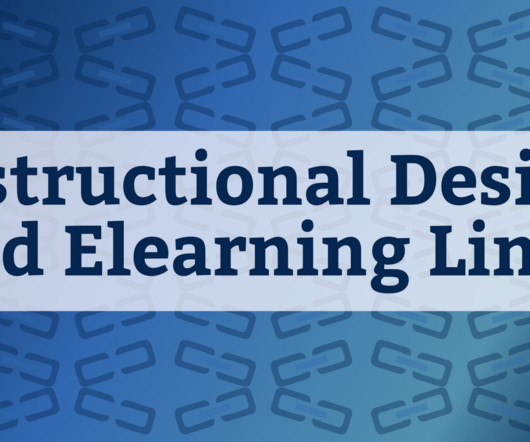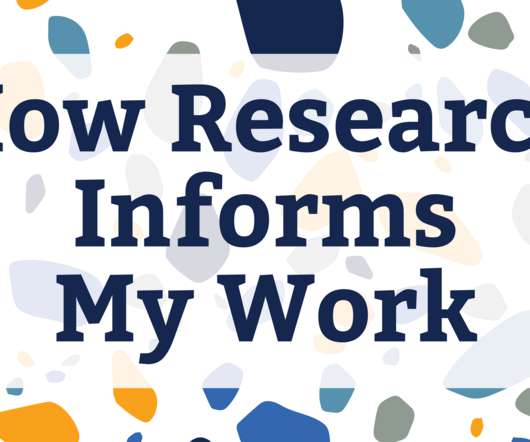Learning and Cognitive Load
B Online Learning
FEBRUARY 25, 2015
In a previous post, I looked at the fundamentals of cognitive load theory.
This site uses cookies to improve your experience. To help us insure we adhere to various privacy regulations, please select your country/region of residence. If you do not select a country, we will assume you are from the United States. Select your Cookie Settings or view our Privacy Policy and Terms of Use.
Cookies and similar technologies are used on this website for proper function of the website, for tracking performance analytics and for marketing purposes. We and some of our third-party providers may use cookie data for various purposes. Please review the cookie settings below and choose your preference.
Used for the proper function of the website
Used for monitoring website traffic and interactions
Cookies and similar technologies are used on this website for proper function of the website, for tracking performance analytics and for marketing purposes. We and some of our third-party providers may use cookie data for various purposes. Please review the cookie settings below and choose your preference.

B Online Learning
FEBRUARY 25, 2015
In a previous post, I looked at the fundamentals of cognitive load theory.

Association eLearning
SEPTEMBER 20, 2017
It’s time for eLearning Trivia! What does “eLearning” stand for? a)cognitive overload. The spelling of “eLearning” has never truly been standardized, but it’s agreed that it describes learning that takes place through electronic devices. a) cognitive overload. a)Effective learning. b)Electronic learning.
This site is protected by reCAPTCHA and the Google Privacy Policy and Terms of Service apply.

B Online Learning
JANUARY 19, 2022
When it comes to eLearning, the challenge is how to best […]. The post Cognitive Theory of eLearning appeared first on B Online Learning. The aim of learning is to close the knowledge gaps that people have and to ultimately improve their performance.

Infopro Learning
MAY 19, 2022
Include real-life scenarios and cognitive theories so that the learners can associate themselves with the facts and situations. Adding multiple interactivities in the online learning content keeps the learners engaged and interested in the training or course. The idea is to eliminate monotonous communication.

Advertisement
Cognitive science theories already supply the answers. Learner engagement and retention doesn’t have to be a mystery. Learn how OttoLearn packages them into a single platform you can use to deliver microlearning based reinforcement training, and go beyond completions to focus on outcomes.

B Online Learning
AUGUST 31, 2020
In our previous post, we looked at the fundamentals of cognitive load theory. The post How to Reduce Cognitive Load in eLearning appeared first on B Online Learning. In summary, to assist learners in transferring information from their […].

The Logical Blog by IconLogic
NOVEMBER 23, 2011
Check out these 10 videos covering the principles of eLearning as defined by researchers including Clark and Mayer. The videos are based largely on the cognitive theory of multimedia.

Experiencing eLearning
APRIL 16, 2019
The links and resources in this post include collections of research, specific research on retrieval practice, an overview of learning theories, H5P’s new branching scenario option, and a widget for changing the colors in the Storyline modern player. Cognitive load, spacing effect, forgetting effect, worked examples, and more.

Experiencing eLearning
JULY 9, 2019
Neuroscience research is used to explain results from cognitive psychology research. They also try to connect cognitive research on the other side with classroom experience. Constructivism is a theory of learning, not a theory of pedagogy. Patterns, Examples, and Tips for eLearning Scenarios. tags: branching.

B Online Learning
AUGUST 30, 2020
Research into our cognitive architecture has led to the development of Cognitive Load Theory (CLT) and related guidelines which, when applied, results in more efficient learning. The post Applying Cognitive Load Theory in eLearning appeared first on B Online Learning. It’s widely accepted that […].

B Online Learning
SEPTEMBER 7, 2017
Research into our cognitive architecture has lead to the development of Cognitive Load Theory (CLT) and related guidelines which, when applied, results in more efficient learning. It’s evidence based, there’s been lots of studies and experiments to test the theory. Three Types of Cognitive Load.

Integrated Learnings
DECEMBER 12, 2012
I recently started reading Thinking, Fast and Slow by Daniel Kahneman, and the chapter on cognitive ease offered all sorts of implications for eLearning design. This, combined with additional discussion in the book, suggests that a bad mood creates cognitive strain, and a good mood promotes cognitive ease. By Shelley A.

Adobe Captivate
NOVEMBER 28, 2017
And the same applies to eLearning design for corporate training. eLearning when designed correctly with sound instructional design strategy has the potential to bring organizational excellence with a positive eLearning ROI. ” How to create Story-Based eLearning? Story-Based Learning – Keep Them Intrigued.

Clarity Consultants
SEPTEMBER 21, 2023
As companies increasingly turn to eLearning platforms to facilitate employee training and development, it’s crucial to understand the cognitive processes at play. Let’s look into the fascinating world of Cognitive Load Theory and explore how it impacts learning from a corporate perspective.

eLearning Company
JULY 10, 2023
Introduction to Cognitive Load Theory and its Relevance in eLearning Cognitive Load Theory (CLT) is a psychological framework that seeks to understand how the mental effort used in the working memory impacts our ability to learn.

Experiencing eLearning
MARCH 8, 2022
This post includes links on insights for L&D, Twine, game design, graphic design, and quality assurance for elearning. If we want to avoid doing slide presentations, we have to know what cognitive (and emotional) advantages these technologies have so we can leverage them for success. Insights for L&D professionals.

Raptivity
FEBRUARY 6, 2013
Wikipedia defines Learning Theory as “Learning theories are conceptual frameworks that describe how information is absorbed, processed, and retained during learning. Learning brings together cognitive, emotional, and environmental influences and experiences for acquiring, enhancing, or making changes in one’s knowledge, [.].

IT Training Department Blog
JULY 10, 2023
If any content in an eLearning course doesn’t directly help one of those three things then you’re doing it wrong. Whether you’re in the instructional design world and are familiar with cognitive load theory or on the content side of things, content overload has the same negative impact on workplace learning.

Experiencing eLearning
MARCH 14, 2023
This post includes links on growth mindset, an AI tool for instructional design, branching scenarios, accessibility, and a magazine issue with elearning articles by multiple prominent authors. Growth mindset Ask the Cognitive Scientist: Does Developing a Growth Mindset Help Students Learn?

eLearning Company
JULY 17, 2023
Introduction to Cognitive Load Theory in eLearning Cognitive Load Theory (CLT), conceived by educational psychologist John Sweller in the 1980s, is a revolutionary framework pertinent to eLearning that is grounded in our understanding of human cognitive architecture.

eLearning Company
MARCH 26, 2023
Introduction to Cognitive Load Theory Cognitive Load Theory (CLT) is a psychological framework that helps us understand the mental processes involved in learning new information.

Experiencing eLearning
FEBRUARY 15, 2022
Good instructional writing is “practical application that is grounded in theory,” to borrow a phrase from Judy Katz. In addition to writing, you can use research to inform your elearning development. Research and theory can inform your day-to-day work in writing, development, and justifying design decisions.

eLearning Industry
NOVEMBER 23, 2019
As learning designers, you have certainly heard of cognitive load theory and it has helped you make informed design decisions. According to cognitive load theory, working memory should not be overloaded in that it disrupts learning because that is where learning is being processed.

The Learning Rooms
APRIL 11, 2025
Welcome to the A-Z of Digital Learning, your comprehensive glossary of learning and eLearning terminology. Alternative text describing the content of an image on a website or in an eLearning course. Equipment, software, or a device which enables learners with disabilities to access eLearning and other content. A Accessibility.

eLearning Brothers
JUNE 20, 2018
When I’ve attended eLearning conferences and workshops, one thing I’ve noticed is that instructional designers are always hungry for more research and knowledge on how people learn and what they can do to help them learn better. That’s where eLearning Rockstar Marty Rosenheck comes in. Realities 360 | San Jose, California.

ProProfs
OCTOBER 23, 2017
This leads us to the theory by psychologist Albert Bandura known as the ‘Social Cognitive Theory’. What is Social Cognitive Theory? Started as the ‘Social learning theory’ in the 1960s by Albert Bandura, it is widely used in psychology, education and communication domains. Observational Learning.

eLearning Industry
APRIL 16, 2021
Cognitive load theory explains why it’s important to give employees exactly what they can handle, in a format that makes sense, so that they can learn, retain, and make use of the training. Here’s your guide to cognitive load theory and why it's so incredibly important to employee learning.

Kapp Notes
SEPTEMBER 12, 2012
These techniques can be used for Instructor-Led Training or eLearning modules. Curiosity in terms of sensory and cognitive inquisitiveness. Fantasy in terms of the emotional and cognitive aspects of fantasy as well as the interweaving of the fantasy and the skills to be learned within the game. n & Lepper, M.R.

eLearning Industry
MAY 22, 2019
Reducing cognitive load can make all the difference when designing great digital learning content. But, given the fact that most of us don’t have a degree in psychology, what exactly does cognitive load mean, and how can it be reduced? This post was first published on eLearning Industry.

eLearning Industry
MAY 10, 2019
Let’s take a closer look at 7 common causes of cognitive overwhelm that every eLearning pro should know about. This post was first published on eLearning Industry. There’s only so much a mind can take before it starts to overload and block incoming facts and stats.

Scissortail's Learning Nest
SEPTEMBER 16, 2024
The Cognitive Accessibility Guidance identifies eight objectives to reduce barriers for people with cognitive, intellectual, and learning disabilities, as well as neurodivergent (or neurologically different) individuals. Cognitive Accessibility Guidance The Cognitive Accessibility Guidance is organized under eight objectives.

Experiencing eLearning
DECEMBER 15, 2020
Ruth Clark’s book Scenario-Based e-Learning: Evidence Based Guidelines for Online Workforce Learning explains how scenario-based elearning helps people learn new skills faster. Chapter 10 of Clark’s book asks, “Does scenario-based elearning work?” Scenario-based elearning can offer return on investment.

Experiencing eLearning
JULY 3, 2011
The paper relies heavily on Cognitive Load Theory, yet we have to realize that it is still a theory rather than a law. Thus, both the authors and the constructivism movement are guilty of jumping on theories before they are fully understood. Posted from Diigo. The rest of my favorite links are here.

Dashe & Thomson
FEBRUARY 4, 2014
Learning Style Theory Cognitive Strain CRT elearning instructional design Learning Theory'

The eLearning Coach
APRIL 23, 2019
John Sweller, who formulated cognitive load theory, explains how instructional designers can design more effective learning experiences.

eLearning Industry
APRIL 10, 2022
We put a lot of thought into cognitive overload, and the techniques we need to avoid it. In this article, I share tips to battle the forgetting curve and lighten the load to improve memory retention in eLearning. This post was first published on eLearning Industry.

Capytech
OCTOBER 7, 2021
10 Tips to Prevent Cognitive Overload in E-Learning. In a previous blog, we explained cognitive load theory and looked at ways to identify if cognitive overload is a problem in your existing e-learning courses. Preventing Cognitive Overload from Occurring When Designing New E-Learning Courses. Focus on the Topic.

Upside Learning
SEPTEMBER 7, 2010
Graphics should then provide a clear representation of the content to be remembered, without extraneous information.This principle is supported by Paivio’s Dual Coding Theory. The dual coding theory, a theory of cognition, was first advanced by Allan Paivio of the University of Western Ontario. Keep a generous margin.

eLearning Industry
NOVEMBER 3, 2023
Schema theory, proposed by Jean Piaget in 1952, is a fundamental concept in the field of cognitive psychology that focuses on how individuals organize and process information. Piaget's theory explains how people develop cognitive structures, or "schemas," to make sense of their experiences.

Experiencing eLearning
MARCH 1, 2012
It made intuitive sense, and I’d never heard a real criticism of the theory. If I think back to the way learning styles were taught to me though, it was never applied the way that the theory is “officially” supposed to work. As an instructional designer, I basically ignore learning styles.

Mike Taylor
NOVEMBER 25, 2022
Where Did Germane Cognitive Load Go? Greg Ashman looks at the “fatal flaws” of cognitive load theory. The first problem with germane cognitive load is a philosophical one. Dig into to this one to learn more and see what he has to say about cognitive load theory. News & Notes. Learn more ?.

Origin Learning
DECEMBER 23, 2014
At the heart of it lies a thorough understanding of the employees who are going to take up this eLearning course. Since we are talking about eLearning here, the way you approach your audience will be directly based on their level of comfort with operating technological devices like PCs, smartphones and tablets.

eLearning Industry
DECEMBER 12, 2019
Here are some tips to avoid cognitive overload and help learners retain valuable knowledge. This post was first published on eLearning Industry. If you want your employees to work more efficiently, you need to design an efficient training course.
Expert insights. Personalized for you.
Are you sure you want to cancel your subscriptions?


Let's personalize your content